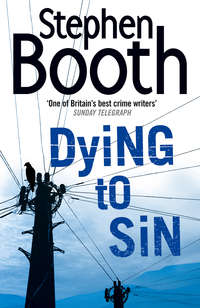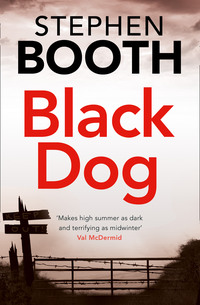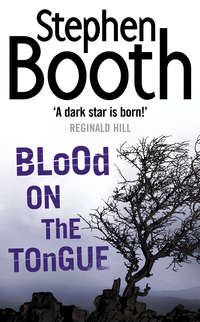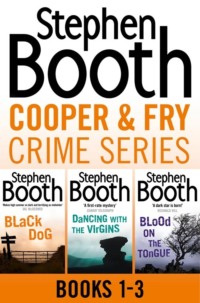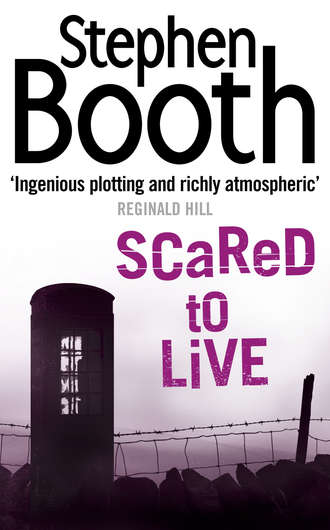
Полная версия
Scared to Live
‘Diane, do you want to have a look upstairs?’ called Murfin, without enthusiasm.
‘Yes, in a minute.’
Fry took a last look at the kitchen, with its silent smoke alarm. She noticed that the cooker was new, too. A Smeg dual-fuel with air-cooling system. A thousand pounds or so, she guessed. Money wasn’t all that short in the Mullen household, after all.
She went back through the sitting room and joined Gavin at the foot of the stairs. She wasn’t sure that she needed to visit the bedrooms. They might have been where the victims died, but they weren’t where the fire had started. If there had been a crime committed, it was here on the ground floor that the evidence would be found, surely?
As she was debating with herself, Murfin settled the question by hauling himself slowly up the stairs, sighing at every step. Fry had no choice but to follow him.
And, in a way, the bedrooms weren’t quite so bad. It was clear that the flames hadn’t reached here. The furniture was almost untouched, though covered by a layer of soot. The covers of the beds had been pulled back, revealing clean, unmarked sheets. The first room she saw might simply have been waiting for Lindsay Mullen to come home and clean up the mess. Apart from the markers where her body had lain when she collapsed from smoke inhalation, of course.
‘Have you got the photos there, Gavin?’
Murfin grunted and passed her the file. Fry had seen the photographs before she came out, and remembered the condition of Lindsay’s body, the cotton pyjamas she’d been wearing, with the left leg rucked up to expose a thin, white calf. Her face was only visible in the close-ups, turned to the right, her left cheek pressed tightly to the floor.
It wasn’t Lindsay Mullen’s face that Fry was interested in, but the position of her body, the angle of her limbs. She turned one of the photos to align it with the room, and checked the direction of the door. Lindsay had almost certainly been going the wrong way. It wasn’t too difficult to picture her, blinded and disorientated by darkness and dense smoke, feeling her way frantically round the walls in an effort to find the door, while her children screamed in the next room. It wasn’t difficult at all. In fact, it was too easy for comfort.
‘Next room, Gavin,’ she said.
‘That’s the kids’ bedroom.’
‘I know that.’
Jack and Liam Mullen had died without leaving their beds, according to the incident reports. They woke up choking, and died from the effects of smoke inhalation. Died calling for their mum, probably.
The house must have been so full of smoke by then that the boys would never have made it to the stairs, let alone through the flames in the hall. Still, their bedroom wasn’t a pleasant place to be. Gavin wouldn’t even come inside the door. He knew the bodies had lain here for some time, since the boys had obviously been dead and beyond rescue. Coroners’ rules required the bodies to be left in situ until forensic evidence had been gathered to establish the cause of death.
Of course, the vast majority of house fires were tragic accidents. Faulty wiring, a fag down the back of the sofa, clothes left too near an electric heater. If sudden deaths didn’t go automatically to CID, she wouldn’t even be here. Fire service codes on this incident were ambiguous – but then, the firefighters on the scene would have had other priorities than looking for a cause.
Fry heard a rustle and a cough, and turned to find a uniformed PC standing at the bottom of the stairs. He was wearing a yellow reflective jacket, and he held his helmet in one hand as he wiped the sweat from his forehead with the other.
‘DS Fry?’ he said, looking up at her. ‘They said you’d be here. I thought you ought to know straightaway –’
‘What is it?’
‘Well, we’ve been talking to the neighbours again. We ought to have found out earlier, I suppose, but we never thought to ask. You know what it’s like, everyone is in shock when a thing like this happens, and with the husband being taken off to hospital –’
‘Out with it, for heaven’s sake.’
He coughed again and turned the brim of his helmet in his fingers. ‘I’ve been speaking to the lady next door. She says it’s only just occurred to her to mention it … Well, it seems there were three children living at this address. Mrs Mullen had a daughter, as well as the two boys.’
Fry stared at the charred wreckage and thought about the bedrooms. There was a closed door at the end of the landing, a third room she hadn’t entered. But the firefighters must have been through the whole house, surely? They wouldn’t have left a bedroom unchecked for victims, would they?
‘The daughter could be away from home,’ she said. ‘Staying over with friends for the night or something. What age is she?’
The officer swallowed. ‘According to the neighbour, the third child is about eighteen months old.’
Fry bit her lip. She hated incidents that involved children. Someone else ought to have taken this job. She ought to have sent one of her DCs. Not Gavin Murfin, though – well, not on his own. But Ben Cooper would have been a good choice. Cooper understood children. He knew all about families. Fry thought he’d probably read far more into the circumstances of this house than she could herself. But Cooper hadn’t been on early call this morning. You couldn’t always get the right officer for a job.
Her eyes were drawn past the PC and back to the two bin liners standing near the front door. It was only then that she realized the bags weren’t bulging because of the amount of clothes stuffed inside them, but because the plastic had melted and sagged into obscene lumps and swellings. One of the bags had split completely when Gavin pushed the door against it, and the skirt of a blue Baby Gap denim dress protruded from the rip.
‘Where’s the husband now?’ she asked.
‘Edendale General,’ said the PC. ‘He suffered minor burns and smoke inhalation trying to get into the house.’
‘Did you say “trying to get in”?’
‘Yes. He wasn’t at home when the fire started. I thought they would have told you.’
‘There seem to be a lot of things that no one’s telling me,’ said Fry. ‘Has everyone around here taken a vow of silence, or what?’
Postman Bernie Wilding was already late with his deliveries in Foxlow that morning, when he remembered the package for Rose Shepherd. That was unusual in itself – Miss Shepherd rarely got more than bank statements and junk mail. Most days, there was nothing in his van for her at all.
Bernie did a three-point turn at the end of Pinfold Lane and drew up to the wrought-iron gates of Bain House. He was listening to Ken Bruce on Radio Two, and he turned the volume down a bit before he lowered the window. He reached out to press the button on the intercom, but got no answering voice. That was a bit odd, too. Folk in the village said Miss Shepherd never went anywhere. She was supposed to be a bit of a hermit, shut up alone here in this big house. And sure enough, she’d never been out before when he’d called with a package.
But he supposed even a hermit must do her shopping some time. A visit to the doctor, the dentist, the optician. Well, it was nothing to do with him, anyway.
Bernie scribbled a message on one of his cards, and was about to push it into the letter box mounted on one of the gates. But when he opened the flap, he saw that a furniture store leaflet was still in there, along with a free newspaper that was delivered by local kids over the weekend. And that definitely wasn’t like Miss Shepherd. Even if he didn’t see her for weeks on end, he knew she was around, because she emptied the letter box. It was a sensible thing to do, otherwise it gave the impression there was no one at home. There were criminals who drove around these villages every night, looking for signs of empty properties.
Uncertain what to do now, Bernie peered through the gates at the house standing among the trees. The curtains were drawn at the front, even on the ground floor. He didn’t know the internal layout of the house, but that must be a lounge or something. You wouldn’t leave the curtains drawn during the day, unless you were sick.
Bernie liked to think of himself as an old-fashioned rural postman, who knew his patch and the people he delivered to. He’d heard so many stories about a postman being the first to raise the alarm when someone was ill or dead and even the neighbours hadn’t noticed. It had never happened to him yet, not in fifteen years with the Royal Mail. But he was always on the lookout for elderly people on his round, the ones who lived alone and didn’t get many visitors. Not that Rose Shepherd was all that elderly – but you never knew, did you?
Ken Bruce was announcing the ten o’clock news bulletin. Was it so late already? Bernie knew he ought to get on – he’d already lost enough time this morning, with having so many special deliveries to make and getting stuck behind the tractor that overtook him every time he stopped. Miss Shepherd was probably out doing her shopping in Matlock, wasn’t she? Monday morning was a good time to go to the supermarket. Nice and quiet. She’d just forgotten to empty the post from her box for once. She’d do it when she got back from the shops.
Bernie pushed his card through the flap, put the package back behind the van seat, then reversed into the road and drove on. He’d missed the news headlines, but Bruce was playing a song he remembered from the sixties – the New Seekers, ‘Now the Carnival is Over’. Bernie was singing quietly to himself as he headed back through Foxlow.
3
Detective Constable Ben Cooper opened his fridge door, then closed it again quickly when he caught the smell. Another thirty seconds of breathing that in, and he’d lose his appetite for breakfast. He had a brief after-image of something nasty wrapped in plastic, caught by the interior light like an exhibit at a crime scene, sordid and decomposing, its DNA degrading beyond use.
‘Well, do you want me to call in and see the solicitor again tomorrow morning?’ he said into his mobile phone. ‘I can manage that, if you like, Matt. But I’m not sure it’ll do any good.’
‘He wants a kick up the pants, that’s what’ll do him some good. Maybe I ought to go in and see him myself. What do you reckon? I’ll go straight into his office when I’ve finished the muck spreading tomorrow.’
Cooper smiled at the thought of his brother bursting into the offices of Ballard and Price, his overalls covered in slurry. Matt could be a bit intimidating at the best of times, especially in an enclosed space. In his present mood, the solicitors’ receptionist would probably call the police to have him removed.
‘It wouldn’t help, you know.’
Matt sighed in frustration. ‘Bloody pen pushers and bureaucrats. They seem to spend their time making life difficult for everyone else.’
‘I suppose Mr Ballard has a job to do, like the rest of us.’
‘Oh, yeah. He takes a lot longer about it, that’s all.’
Cooper ran a finger round the fridge door, checking the rubber seal for gaps. It hadn’t occurred to him things could get as bad as that so quickly, just because he hadn’t bothered checking inside for a few days. It wasn’t as if the weather was particularly warm or anything. It was nearly the end of October, and summer was over in the Peak District. But the fridge had come with the flat, so he wasn’t sure how old it might be.
‘I don’t know what else I can do,’ he said. ‘You’re the executor, Matt.’
‘I hadn’t forgotten.’
Of course, he knew what was bothering his brother and making him so impatient. Probate on their mother’s will was taking so long that he was starting to get worried about the future of Bridge End Farm. If money had to be found from the estate, the only way it could happen would be if assets were sold off.
‘I thought you’d know a bit more about the law than I do,’ said Matt.
‘Well, not this part of the law.’
He didn’t bother to tell Matt that his knowledge of criminal law was also a bit sketchy. There were eight thousand criminal offences on the statute books – and more than a thousand of them had been invented since Cooper became a police officer. Without the manuals, he’d be lost, like everyone else.
Cooper left the fridge alone and crossed the kitchen, dodging the cat that was sitting looking at him expectantly, having heard a rumour there might be food. On the days he was at home, meal times seemed to come round every hour.
‘Besides,’ he said, ‘don’t forget how much Mr Ballard charges for his time.’
‘You’re right, Ben. Just a phone call then, I suppose.’
‘At least it’ll keep the subject fresh in his mind.’
There was silence for a few moments. The Cooper brothers had always been comfortable with silence. They’d grown up together on the farm hardly needing to speak, because each understood what the other was thinking. But that was when they were physically together. You could read a person’s thoughts in their face, in the way they moved or breathed, or what they did with their hands. It was different on the phone, though. Silence felt awkward and wrong. Not to mention a waste of money. With his mobile pressed to his ear, Ben started to wonder whether he could get a reduced tariff from Vodaphone for the amount of non-talk time he used.
But in this case, he sensed that there was more to his brother’s silence than awkwardness.
‘Is there something else, Matt?’
‘Yeah …’
Ben felt his stomach tighten. For a second, he thought he was going to be sick, and he looked to see if the fridge door had fallen open again and released the nauseous smell into the room. After the death of their mother, there surely couldn’t be more bad news already. But he could read a lot into one word from his brother.
‘What is it? Something wrong with one of the girls?’
‘No, they’re fine,’ said Matt. ‘Well, I think so.’
‘You’re not making much sense, Matt.’
‘Look, Ben, I’ve made an appointment to go into the surgery on Friday. I want to talk to Dr Joyce. And if necessary, I’ll ask to see the specialist who treated Mum.’
‘Why? We know what happened to her – it was a series of strokes. It happens all the time in people of her age.’
‘I don’t mean the strokes. I mean the other problem.’
The family had rarely referred to Isabel Cooper’s condition by name. For a long time, it had been ‘Mum’s problem’. Towards the end, before she died in Edendale District General from a brain haemorrhage, it had become ‘the other problem’. Now, it seemed to Ben there was no point in trying to avoid spelling it out. Mum wasn’t around any more to be upset if it inadvertently slipped out in her presence.
‘Oh, the schizophrenia.’
‘Yes.’
‘I don’t understand, Matt. What do you want to find out that we don’t already know?’
‘I can’t talk to you about it on the phone – it’s too complicated. Can you come over some time? I’ve got a lot of stuff to show you.’
‘Well, I’m going to be a bit busy this week –’
‘So what’s new?’
‘All right, what if I call at the farm tonight when I come off duty?’
‘That’ll do.’
‘See you, then.’
Cooper put out a bowl of cat food and placed it on the floor in the conservatory, near the central-heating boiler. Randy was an animal with a fixed routine and firm ideas about his territory.
Then he went back to the fridge, took a deep breath and eased open the door. He scooped out some rotten tomatoes, half a carton of sour milk, and a wedge of Stilton with its blue veins blossoming into a furry carpet. They all went into a plastic bin liner. He wasn’t sure any of the items accounted for the smell, though. Poking in the salad tray at the bottom of the main compartment, he found a liquefied lettuce, which probably did.
When he’d got rid of the worst, he tied up the bin liner and put it to one side. Now he ought to remove everything else from the fridge and give it a good clean. Probably it could do with defrosting, too.
But then Cooper hesitated. It would do later on, wouldn’t it? Tomorrow, even. He closed the fridge, put the bag near the back door, and returned to the sitting room. He put on his shoes and jacket, and checked how much money he had in his wallet. Then he made sure his phone was fully charged. Allowing your phone battery to go flat was as bad as letting your car run out of petrol. Both things happened now and then, but it was better if they happened to someone else.
Finally, he left the flat. For once, even the smell of the morning traffic was like a breath of fresh air.
He was unsettled by his conversation with Matt. He hoped his brother wasn’t having to cope with too many worries at once. There were certainly some decisions to be made about the future of Bridge End, though. The new farming support payments favoured the more productive farms in the valleys, and an upland farmer’s income could be halved, unless he changed his ways. The suckler herd might have to go, for a start – no matter how environmentally friendly and picturesque they were, grazing cattle were becoming as economically unviable as sheep.
Matt could intensify the dairy herd, or leave part of the land unfarmed, in return for environmental grants. On the other hand, he could abandon the idea of running a profitable farm altogether and get himself a job stacking shelves in a supermarket.
On his way through the market square, Cooper pulled out his mobile and chose a number from his phone book. His call was answered almost straightaway.
‘Hi, it’s me. How are you this morning?’
She sounded pleased to hear from him, and the sound of her voice alone made him feel better. He didn’t know how she did it; perhaps it came of being a civilian.
‘Oh, I’m fine, too,’ he said. ‘No, really. There’s nothing wrong at all. I just wanted to find out how you were.’
He listened to her talk for a while, neither of them saying much, but enough to put a smile on his face as he crossed Hollowgate towards the Raj Mahal and the pedestrianized area.
He had to end the call when a couple of acquaintances stopped to say hello. Cooper couldn’t place their names at first. But he knew so many people around Edendale that it wasn’t surprising. Faces from his childhood haunted him constantly. He’d see an old schoolfriend passing in the street, then immediately another and another. It was like the way a phrase he’d heard for the first time suddenly seemed to be repeated everywhere, as if someone was trying to send him a message. What sort of message could these familiar faces be trying to convey? This is where you belong, perhaps.
Later that morning, Cooper found himself watching a man in a grey sports jacket approaching a cash machine outside Somerfield’s supermarket. Running his finger along the edge of the card slot, the man glanced over his shoulder with an apologetic smile. He wasn’t sure whether he liked being watched or not.
There were two ATMs at Somerfield’s, both set into the outside wall near the trolley park, about fifteen yards from the main entrance. A small queue of shoppers had formed at the other machine, fidgeting with their carrier bags and purses.
‘If you feel an obstruction of any kind, don’t use it. That’s the best advice. Usually there are a couple of tiny prongs. Here, see?’
With a flick of the finger, the man pulled out a thin, clear sleeve of rigid plastic. He held it up to reveal a loop at the back.
‘This is the old Lebanese Loop trick. The loop retains a card when it’s inserted. Since the machine can’t read the magnetic strip, it keeps asking you to re-enter your PIN. Someone standing behind you watches you tap your number in. When you walk away, the suspect removes the card and empties your account. Bingo.’
‘Surely that type of device is easy to detect?’ said someone in the watching group. ‘We just saw you do it.’
‘But I know what to look for.’
PC Steve Judson had greying hair, a little longer than favoured by most police officers. He worked with the Plastic Crime Unit, a team struggling to deal with a mounting wave of cash and credit card fraud. According to the latest figures, it was big business – worth at least forty million pounds a year across the country.
Judson looked at the queue for the adjacent cash machine. ‘This is a typical location. The ATMs would be more secure inside, but the store isn’t open twenty-four hours. Some customers want to use them late at night, when this car park is probably deserted.’
‘Is that when the biggest risk is, rather than when the cash machines are busy?’ asked a female DC, one of two who’d driven over the hills from B Division for the plastic crime session.
‘The risk is different. If you look at the people in the queue there – they’re close enough to each other to make shoulder surfing easy. But at night, when the place is empty, you’d be pretty damn suspicious of somebody who came and peered over your shoulder, wouldn’t you?’
There were other officers present in the car park who’d come from Nottinghamshire and even from Leicestershire. Strangers, but probably future colleagues. No one was talking about their future this morning, but it must have been in everyone’s minds when they greeted each other.
‘It isn’t so long ago that the NCIS bulletins were warning of cash machine gangs spreading out of London down the M4 to the West Country. Did they get it wrong?’
‘No, not at all. Those gangs did good business in the West Country, so they decided to go nationwide. Now they operate in any place they can recruit enough illegals.’
‘Illegals?’
Cooper could hear a few sets of antennae going up, alert for derogatory remarks. It was always a tough call, knowing when to report a colleague for political incorrectness. If you tolerated it, your own career could be on the line.
But PC Judson seemed not to have noticed the reactions from the group.
‘Some illegals are being trained for cash machine work within twenty-four hours of coming off the boat. That way, they can pay back the traffickers. It’s better than slogging your guts out in a carrot field in East Anglia for two quid an hour, I suppose.’
Nobody laughed, or even dared to nod in agreement. A Nottinghamshire detective next to Cooper shuffled his feet in the shredded tree bark around the roots of an ornamental birch.
Somebody at the front asked a question about identity theft, which set Judson off on a new tangent. The Nottinghamshire officer leaned towards Cooper.
‘Are you Derbyshire?’ he said quietly.
‘Yes, I’m based right here in Edendale. DC Cooper.’
‘Ross Matthews. Hi. What’s it like working here?’
‘It’s OK,’ said Cooper defensively.
Matthews nodded. ‘I’m at St Ann’s, and it’s a nightmare. I might put in for a transfer when we go global.’
He didn’t need to explain what he was talking about. Everyone knew that the number of regional police forces would soon be reduced dramatically. A government commission had concluded that any force with fewer than four thousand officers was too small to deal with serious crime. So Derbyshire was certain to disappear. Even its bigger neighbour, Nottinghamshire, had suffered highly publicized problems that had led its chief constable to admit his detectives couldn’t cope. Within a few months, all the officers here this morning might be working for one huge East Midlands Constabulary.
‘Why not?’ said Cooper. ‘We can always do with some help here.’
He realized that Judson had finished speaking and was looking at him over the heads of the group, waiting for his attention.
It was then that Cooper’s mobile rang. Probably he should have switched it off. He bet everybody else had put theirs on to silent vibrate, but he’d forgotten this morning.
He looked at the number on the display, and saw it was Diane Fry. His DS shouldn’t be calling him, not when she knew he was on the plastic crime exercise. Cooper looked at Judson and shrugged apologetically, then walked a few paces away from the group.
‘Yes, Diane?’
‘Where are you right now, Ben?’


